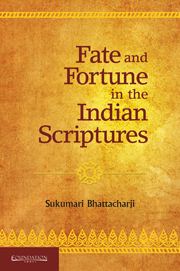Book contents
- Frontmatter
- Contents
- Preface
- Introduction
- Chapter 1 Inception
- Chapter 2 Rebirth and Transmigration
- Chapter 3 Karman and its Consequences
- Chapter 4 Karman, Fate and Free Will
- Chapter 5 Fate, Eschatology and Liberation
- Chapter 6 Premonitions and Presages
- Chapter 7 Deflection: Remedial Measures
- Chapter 8 Vicarious Deflection
- Chapter 9 Fate and Human Endeavour
- Bibliography
- Index
Chapter 2 - Rebirth and Transmigration
Published online by Cambridge University Press: 05 October 2014
- Frontmatter
- Contents
- Preface
- Introduction
- Chapter 1 Inception
- Chapter 2 Rebirth and Transmigration
- Chapter 3 Karman and its Consequences
- Chapter 4 Karman, Fate and Free Will
- Chapter 5 Fate, Eschatology and Liberation
- Chapter 6 Premonitions and Presages
- Chapter 7 Deflection: Remedial Measures
- Chapter 8 Vicarious Deflection
- Chapter 9 Fate and Human Endeavour
- Bibliography
- Index
Summary
OF the two major formative ideas viz. rebirth and karman which constituted the core or basis of fatalism in India, the first to appear was rebirth. And, interestingly enough, at its inception it was not recurring births, but recurring deaths. And even more strangely, this conceptual chapter opens not for man but for the Gods and has an element of teleology inherent in the episode. The Śiatnpatha Brāhmana broaches the subject: “Now indeed the Gods were at first mortal, only when they gained the year did they become immortal.” “Through the sacrifices the Gods became immortal. Death was scared: ‘what shall be my share?’ They reassured him, ‘From now on none shall be immortal in the body… They who know this or do this holy work come to life again, when they have died; and coming to life, they come to immortal life. But those who do not perform this act come to life again and again.” “If one does not offer these oblations then one gets (i.e. meets) death in the different worlds.” More concretely this age knew one form of death, namely hunger. Hunger is a living death, “by death, by hunger was everything pervaded, hunger is death.”
So we have a few basic tenets regarding rebirth: (1) it first threatened the Gods and when Death was alarmed at the prospect of losing his share of food viz. the victims of death, (2) the Gods laid down two principles (a) the gaining of the year and (b) the performance of certain sacrifices, by which (3) they became immortal with a solemn assurance to death that ‘from now on none shall be immortal in the body.’ Needless to say, this applies to men alone because the Gods had already attained immortality. So men could perform sacrifices and gain immortality after they had died at least once.
- Type
- Chapter
- Information
- Fate and Fortune in the Indian Scriptures , pp. 33 - 42Publisher: Foundation BooksPrint publication year: 2014

